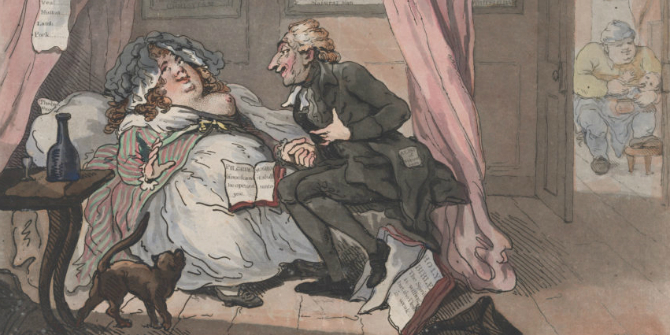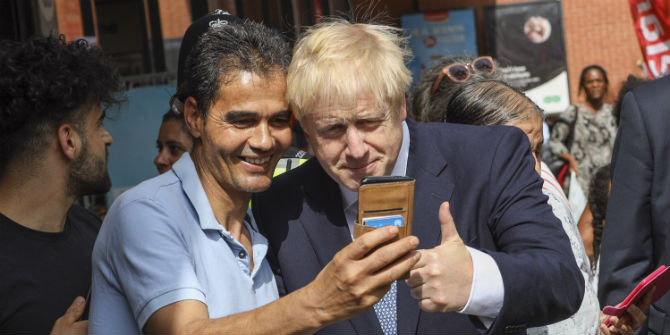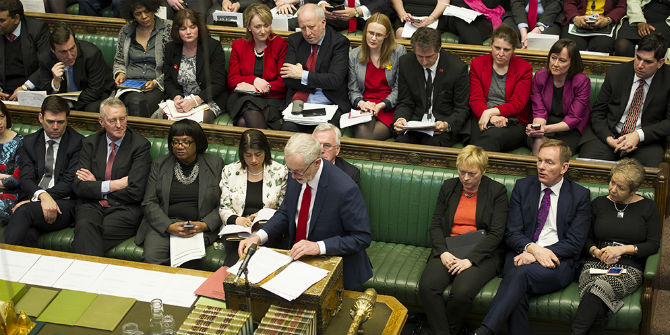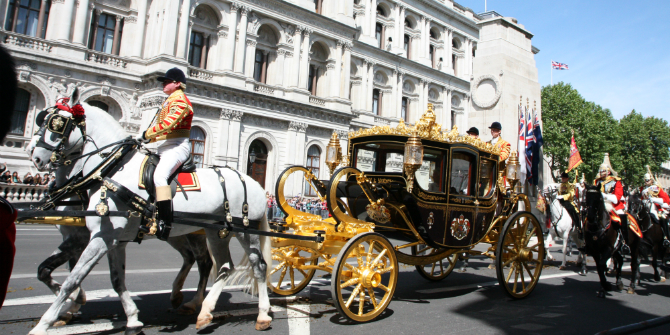 The debate about Brexit has seemed like a bad dream, writes Philip Allott (University of Cambridge). Government and politicians have made it worse than it need have been. It is not too late to complete the debate calmly and reasonably, for the good of this country and for a wider good.
The debate about Brexit has seemed like a bad dream, writes Philip Allott (University of Cambridge). Government and politicians have made it worse than it need have been. It is not too late to complete the debate calmly and reasonably, for the good of this country and for a wider good.
The bad temper – and the poverty of rationality – in the public debate about Brexit have been attributed to the gravity of the choice before the country. How could we keep calm and carry on, when the future of Britain, Europe and the world is at stake? And, surely, the British people had already decided the matter in 2016? So what was the debate about? Mental confusion was added to existential anxiety. British muddling-through had finally met its match.
Luis Buñuel’s film The Discreet Charm of the Bourgeoisie (1972) can help us to understand the situation. Six conventional bourgeois friends meet for dinner. During the elegant meal there are repeated bizarre and terrifying intrusions from outside. Do they really happen? Is their dinner a dream? But how can they be sharing a dream? Or is the film itself our shared dreaming, as we watch it?

Surrealism in art allows us to understand that reality is a waking dream, and what we call dreams are, for us, as real as reality. We have our own dreams and our own reality. But we can also share our dreams and share a reality, a reality that we call everyday reality.
Brexit has been waged like a war, a war of words, forcing its way crudely into our everyday reality, challenging our precious civility. We have been a nation under traumatic stress. There must be many people who have hoped that they might wake up and find that it had all been a bad dream. Surely this could not be a great and uniquely experienced nation working out an existential decision.
Governments control our dreaming. We cannot have everything that we want. Politicians, at least in a liberal democracy, try to make our dreams come true. On this occasion, the Government has seemed to be lost in a reality of its own. Politicians have seemed to be possessed by their own private dreams, sharing them reluctantly and ineffectually. Both of them have let the people down, as the leaders we need in a time of extreme confusion and anxiety. We have been mesmerised spectators of a terrible failure of politics. And, adding to the confusion, evidence has been accumulating from around the world that makes people wonder whether liberal democracy is still capable of managing the future of vastly complex societies in an ever more chaotic world.
Some people go further and wonder if something is changing in the nature of the individual and collective human condition which is making us ungovernable in principle, at least in the ways of government that we have inherited from the past.
There have been many times in recorded human history when it has seemed that chaos had finally triumphed over order. We remember the words of the Irish poet W.B. Yeats writing at such a time.
‘Things fall apart; the centre cannot hold; / Mere anarchy is loosed upon the world …The best lack all conviction, while the worst / Are full of passionate intensity.’ The Second Coming (1919).
Prophets of doom can help to cause the doom that they prophesy. But they can also tell us what we need to do, before it is too late. Is it too late for Britain to wake up from its Brexit nightmare and complete the debate calmly and reasonably, as we have had to do in the face of so many existential threats in the two thousand years of our persistent dreaming and our ever-changing everyday reality?
There is no reason to believe that Britain has lost its capacity to dream good dreams, and to change its reality for the better. In the present situation, we have a rare opportunity to share the making of our reality with the rest of Europe and the rest of the world. We should surely have the courage to hope that we might work together to make a better everyday reality for all human beings everywhere, before it is too late. Lost hope can always be found. But, on this occasion, it needs to be found rather soon.
This post represents the views of the author and not those of the Brexit blog, nor the LSE.
Philip Allott is Professor Emeritus of International Public Law at Cambridge University. His most recent book is Eutopia. New Philosophy and New Law for a Troubled World, first published in 2016 to mark the 500th anniversary of the publication of Thomas More’s Utopia.







it is caused by the feeding frenzy of the press and media and our open debating system.
The new form of anonymous insults poorer upon leavers in the main have furled open and vicious debate.
Where Europe has played its cards close to chest.
Remember back in 2017 when Europe would not talk about trade until they agreed the divorce bill.
We should have said ok, give us a call when your ready.
But we have been playing with a straight bat, typically British.
On the other side they have constantly said the answer is no, what is the question.
Europe must defend their dictat, and we want to leave the dictat.
I don’t see what the issue is over he border.
We leave with no deal.
Europe will then have to decide on a hard border or not.
We won’t put one in!
Why would we?
Europe must do a free trade deal or put a border in themselves.
Why are they insisting that we shouldn’t put a hard border in when it is they that would put it in place when we leave?
madness!!!
Walk away, they then must agree a free trade deal.
Problem solved!
Oh dear, Dennis, you write as a committed Brexiteer. Fine, but don’t therefore assume too much.
It is the UK which decided to instigate Brexit and the EU has very good reasons for not wanting that to happen. We pleaded to join the EEC. In 1975 we had a referendum to stay, with a 65% for vote yes. We have now made a unilateral decision to leave, on a dubious referendum (Where many lies were made on both sides).
The EU has done no more that try to defend itself, and what we originally signed up for. Its ‘dictat’ has been no more that to restate the agreements we signed up to, for example (but very profoundly) the four freedoms. We are rejecting these, not the EU.
Jep
Well spotted I am a committed Brexiteer. But not a sheep, I took a long to me to research pto’s snd Cons as far as I could.
In 1974 ( I voted ) the question was about the EEC ( common Market ) today we find ourselves entangled in a political union.
We have never been asked about that.
We know when a politician lies, their mouth opens!
You are at least fair to acknowledge that lies on both rides were told, so the swing of votes influenced by lies should be equal.
It is therefore my argument that democracy should prevail and we should leave, full stop!
Whilst I agree with you that I am making Some assumptions the project fear have also made many many assumptions that recent history have shown to have been inaccurate.
Very few have attached any importance to the fact that Europe will without doubt suffer at least as much as we may and I say may!
The rich countries of Europe inc U.K. will survive, but the struggling countries will find it a catastrophe if we have a hard Brexit.
They will break cover very soon.
I want a good deal as does Europe, but we can only get that if we display our resolve by being prepared to walk away.
Should have done it 12,months ago.
That’s a standard business negotiating method.
Today’s issues are not about the business deal, it’s about politics and self gain of poloticians
The day will come through our system the people will decide if they should keep their jobs
Unlike the EU!!!!
Zut alors! A sensible column at the LSE and political science Brexit blogsite. The esteemed, my words, eminently reasonable professor is pouring some learned oil on troubled waters. Well, Professor Allott would know a lot more that he’s letting on. I do hope he writes a book about the Brexit thing. Just now, I’m reading Tim Shipman’s tomes, Fall Out and All Out War. Absolutely useless if one wishes to know what is really going on, but of course, if one didn’t know, one wouldn’t know that books written for the …ah, public tell us nothing.
I wish I had the wherewithal to write how it really is. I might have a bit of trouble getting published, of course.
Mention geopolitics, and in no time one’s comment disappears. The plebs are not allowed to even think about geopolitics. But, back to Tim Shipman, such narrative is more like a novel, less info and more entertainment.
In addition, such writings are wasting people’s time big time. The object, so people don’t have time to think and, even more important, people are having the wool pulled over their eyes.
We await with baited breath, if not with abated breath, for we would soon be gasping for air, for the next instalment of the war of attrition waged by the establishment on behalf of the Establishment. Although, we are hard put trying to sift one instalment from the next. Whatever will be will inexorably be, no fear, the fear campaigns notwithstanding. The electorate is being given the finger by the establishment political operatives in power. Those not in power just now may be little better in the way of doing what is required of the government. Because, what is required is very much contested between the haves, who have political power, and the have nots, who have no political power as long as no independent members are suffered to enter Parliament. Somehow, the party system and the mainstream media manage to keep out real opposition. The FPTP system is the main stumbling block. Just imagine if UKIP had got seats according to votes.
Developments in Europe have become very interesting of late. Reading Shipman, it is obvious the people in government and the top of the bureaucracy, a slew of high-powered and highly-paid individuals, acting as a cluster love-in, despite real and perceived differences, are too busy bamboozling the public to be bothered with the business of government. But what a fine time they have. My, who pays for all that gallivanting and carousing? They must be loaded. They are also burdened. Such ennui. The end of empire for them there, soon they will be able to seamlessly segue into their new roles, as of old, in the new empire they are, indeed, already working for, if working is the operative verb here, indeed, one wonders. In the next role they won’t have to work. They will be well-rewarded for their treasonous behaviour where they’re at. Empiricists all.
There is much confusion here, perhaps starting with the reference to Le Charme Discrete de la Bourgeoisie. There is little dream state going on with Brexit. Wishful thinking, yes. But there is also a great deal of bigoted ignorance. There is also a great deal of self-interest, bot in terms of the voters, but also, very evidently, with the politicians. It is certainly not the changing of the individual or the collective human condition, hence the selfishness. First of all human drives is ‘preservation of oneself.’ Currently May is a very good example of this.
You hope for us to continue to dream the dream. What we need to do it to wake up to the reality, and that is most certainly not what we have been fed by the politicians or the press, and what many understand Brexit actually means.
But isn’t the film ‘The Discreet Charm of the Bourgeosie’ abour different realities. How many of us feel disconected to places which were safe and unchanging in our memory. Is’nt Surrealism an expression of that disconnect with what is comfortable and normal one believes is real and what the subconceious is telling us. Brexit has been a shock to the comfortable people in London in particular ,which they see as a doomsday hell..But many of us have long felt as if we are living in a parrallel world of a bottom speed economy.in a supposedly wealthy country. There is the fast almost weekly change in London to glass awe inspiring towers yet one feels a chill of fear at their vulgar boasting excess. At the same time there is the marvelousness of their design and engineering. to admire , Yet in one’s same mind there are the scores homeless in such doorways. Perhaps this dream state is a manifestation off fear. Perhaps it is to do with the unbalanced economy. There is a malaise. There is nothing of interest for people to make in any job except the most demeaning .Bad EU policy and bad government policy to have thought it a good idea to think the City could provide enough money as if it were Monaco..There are many seaside towns for instance,which are like spectures in a nightmare, as as is the once prosperous northern seaside town I remember from my childhood..which is almost delelict and it’s people shattered. Brexit has at least given them hope. I hope that there there will be a new beginning too.